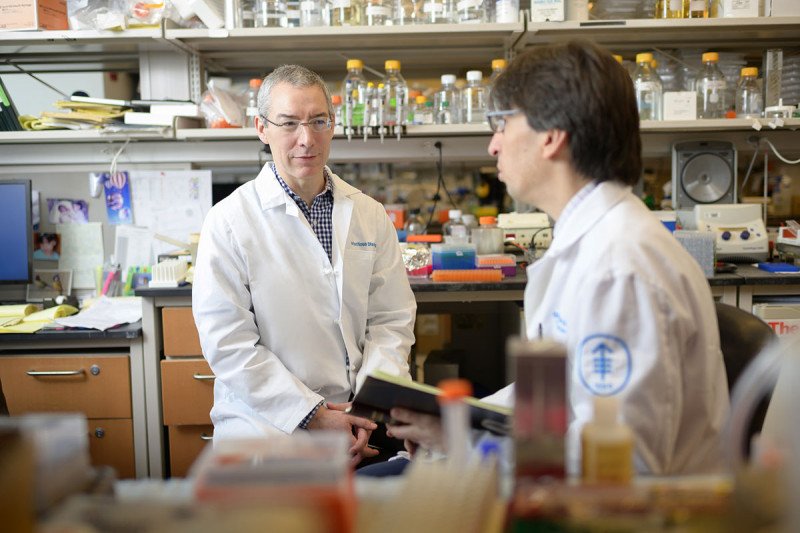
For people with early-stage bladder cancer, an immunotherapy called BCG has been the standard treatment for more than 30 years. It was approved by the FDA in 1990 — it was, in fact, the first ever cancer immunotherapy to be approved — yet scientists still don’t fully understand why the treatment works.
A new study published July 17 in the journal Proceedings of the National Academy of Sciences (PNAS) by researchers at Memorial Sloan Kettering clarifies BCG’s mechanism of action. In the process, it overturns some long-standing dogma.
“BCG therapy is arguably one of the most successful immunotherapies for cancer,” says physician-scientist Michael Glickman, Director of the newly created Center for Experimental Immuno-Oncology (EIO) at MSK. “But we need to understand how it works if we’re going to make the most of this and other forms of immunotherapy.”
BCG (which stands for bacille Calmette-Guérin) is a weakened strain of the bacterium Mycobacterium bovis, originally developed as a vaccine against tuberculosis. It is injected directly into the bladder wall of patients with bladder cancer that does not involve the bladder muscles. The bacteria infect some of the cancer cells, and the person’s immune system is stimulated to find and kill both infected and uninfected cancer cells.
The standard explanation for how BCG works is that the immune system learns to recognize distinguishing bits of protein, called antigens, found on the bacterium. This is similar to how familiar vaccines against infectious diseases work. But the MSK researchers found that immune cells that recognize BCG antigens are not responsible for the therapy’s effect against cancer. Rather, it’s immune cells that recognize antigens on tumor cells that make the difference.
The researchers made their discoveries in mice with bladder cancer. They showed that administering BCG to the mice resulted in increased numbers of immune cells called T cells in the tumor. Immunity to this cancer could be transferred from one mouse to another by transferring these T cells — but only if the first mouse had cancer. T cells from mice without cancer that received BCG treatment gave no cancer immunity to the other mouse. This result shows that the immune system is responding to antigens that are specific to tumors, rather than antigens that are specific to BCG.
What’s Old Is New Again
Bacterial therapies for cancer are not new. They go back more than a hundred years to William Coley, whose eponymously named “toxins” were some of the first cancer immunotherapies ever developed. Dr. Coley was a surgeon at Memorial Hospital (then called the New York Cancer Hospital) who noticed that people with cancer who got severe infections sometimes saw their cancers regress. He began administering a vaccine of heat-killed bacteria to patients in the hopes of spurring their immune systems to attack cancer. Dr. Coley had some success with his approach, but the results proved unpredictable and hard to replicate, so his toxins eventually faded from use.
Inspired by Dr. Coley’s work, scientists at MSK continued to research immune-based treatments for cancer. This sustained research effort eventually led to the development of modern forms of immunotherapy, including immune checkpoint inhibitors. These drugs “take the brakes off” T cells and allow them to find and fight cancer cells that display unique neoantigens (those produced as cancers divide and mutate).
“We show that BCG is similar to checkpoint inhibitors in that it works by eliciting an immune response against cancer neoantigens,” says Gil Redelman-Sidi, a physician-scientist who collaborates with Dr. Glickman and is the co-corresponding author on the PNAS paper. “These results bring BCG into the modern world of immunology.”
There are some unique aspects of BCG’s mechanism, too. Unlike checkpoint inhibitors, which seem to rely on a type of T cell called CD8 cells, BCG relies on CD4 cells to eliminate the tumor. The CD4 cells produce a molecule called interferon gamma, which binds to a receptor on tumor cells and kills them. It’s not quite understood how this killing happens, but graduate student Anthony Antonelli, the paper’s first author, is working on this problem now.
BCG treatment does not work for everyone, despite its reliable successes. Dr. Glickman thinks that this new understanding of BCG’s mechanism may help scientists develop biomarkers that could indicate who is likely to benefit from the treatment. “So, for example, if you have CD4 T cells or interferon gamma in your urine or blood, that might identify you as someone who is destined to respond to BCG,” he says.
Extending these mouse findings to humans will be one of the main goals of the Center for Experimental Immuno-Oncology. As a part of this effort, the EIO Center will create a cell bank of immune cells prepared from human tumors. “MSK has a lot of human tumor samples, but what we don’t have is a collection of immune cells from tumors treated with different therapies,” Dr. Glickman says. “This bank will be a valuable asset for researchers who want to extend their laboratory findings to people with cancer.”


